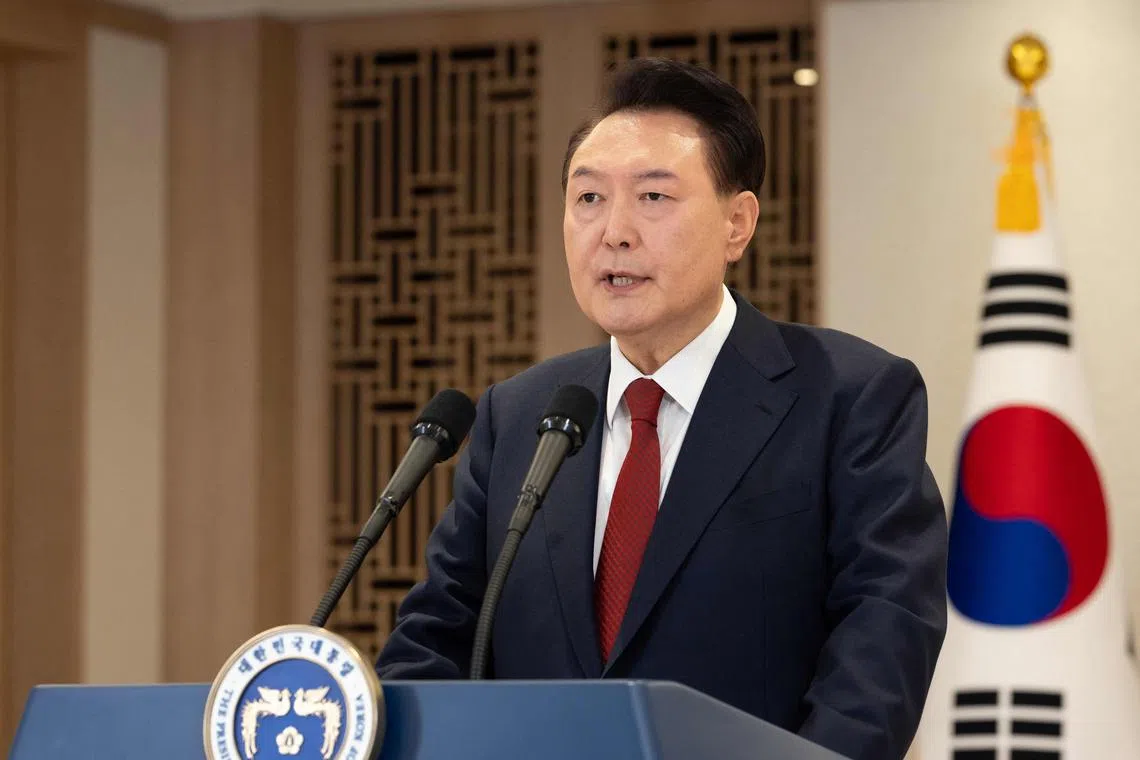Second martial law impeachment vote looms for South Korea’s Yoon Suk Yeol
Sign up now: Get insights on Asia's fast-moving developments

South Korean President Yoon Suk Yeol on Dec 12 vowed to fight "until the very last minute", and defended his decision to declare martial law.
PHOTO: AFP
SEOUL - South Korea’s opposition leader warned his ruling party colleagues on Dec 13 that “history will remember” if they do not back the impeachment of President Yoon Suk Yeol, with just over 24 hours until a vote to remove him from office.
Mr Yoon’s short-lived imposition of South Korea’s first martial law
An attempt to remove him from office on Dec 7 failed when lawmakers from the ruling People Power Party (PPP) boycotted the impeachment motion.
But after a week of backdoor politicking and a mounting investigation into Mr Yoon and his inner circle, analysts now say the main opposition Democratic Party may have better luck with its second attempt.
The impeachment vote on Dec 14 will take place around 5pm local time (4pm Singapore time), with Mr Yoon accused of committing “insurrectionary acts undermining the constitutional order” relating to his martial law bid.
Two hundred votes are needed for it to pass, meaning opposition lawmakers must convince eight ruling party colleagues to defect.
On Dec 13, the leader of the Democratic Party, Mr Lee Jae-myung, implored the PPP
“What the lawmakers must protect is neither Yoon nor the ruling People Power Party, but the lives of the people wailing out in the freezing streets,” Mr Lee said.
“Please join in supporting the impeachment vote tomorrow. History will remember and record your choice.”
Two ruling party lawmakers supported the motion last week.
And as at noon on Dec 13, seven ruling party lawmakers had pledged to support the impeachment – leaving the vote on a knife-edge.
But members of the opposition are confident they will get the votes.
Lawmaker Kim Min-seok said on Dec 13 that he was “99 per cent” sure the impeachment will pass.
Should it pass, Mr Yoon will be suspended from office while South Korea’s Constitutional Court deliberates.
Prime Minister Han Duck-soo will step in as interim president during that time.
The court will then have 180 days to rule on Mr Yoon’s future.
If it backs his removal, Mr Yoon will become the second president in South Korean history to be impeached.
There is also precedent for the court to block an impeachment: In 2004, then President Roh Moo-hyun was removed by Parliament for alleged election law violations and incompetence.
But the Constitutional Court later reinstated him.
The court also currently has only six judges, meaning their decision would need to be unanimous.
And should the vote fail, Mr Yoon can still face “legal responsibility” for the martial law bid, researcher Kim Hyun-jung from the Korea University School of Law told AFP.
“This is clearly an act of insurrection,” she said.
“Even if the impeachment motion does not pass, the President’s legal responsibilities under the Criminal Code... cannot be avoided.”
Mr Yoon has remained unapologetic and defiant as the fallout from his disastrous martial law has deepened.
In a televised address on Dec 12, he vowed to fight “until the very last minute” and doubled down on unsubstantiated claims that the opposition was in league with the country’s communist foes.
Thousands have taken to the streets of Seoul since Mr Yoon’s martial law declaration to demand his resignation and jailing.
Mr Yoon’s approval rating – never very high – has plummeted to 11 per cent, according to a Gallup Korea poll released on Dec 13.
The same poll showed 75 per cent now support his impeachment.
Protesters run the gamut of South Korean society – from K-pop fans waving glow sticks, to retirees and blue-collar workers.
“Impeachment is a must and we must fight relentlessly,” 52-year-old Kim Sung-tae, a worker at a company that makes car parts, told AFP.
“We’re fighting for the restoration of democracy.”
Teacher Kim Hwan-ii agreed, saying: “I’m so angry that we all have to pay the price for electing this President.” AFP


